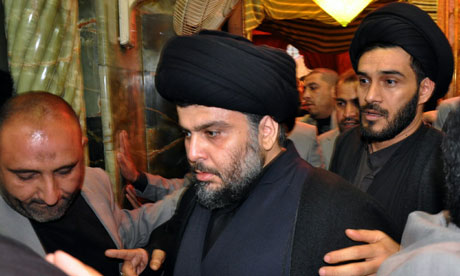Sadr is wanted by the Iraqi judiciary for his alleged involvement in my father's murder. Why was he not arrested on his return?
By Haydar al-Khoei
This commentary was published in The Guardian on 06/01/2011

Moqtada al-Sadr has finally returned to Najaf in Iraq after almost four years of self-imposed exile. Senior Sadrists claimed that the reason he left Iraq was to continue his theological studies in Iran. However, there was another thorny issue behind his absence: Sadr is still wanted by the Iraqi judiciary for his alleged involvement in my father's murder eight years ago.
The arrest warrant for Sadr stands to this day as Iraqi judge Raed al-Juhi signed it in April 2004. Juhi is the investigative judge who presided over the first hearing of the Dujail massacre that eventually led to Saddam Hussein's execution in December 2006.
The fact that Sadr was not arrested upon his arrival this week says a lot about Iraq's new government and its claimed dedication to integrity.
Nouri al-Maliki, the prime minister, gained a lot of political currency when he tackled Sadr's militias in March 2008 and his parliamentary bloc, named the State of Law, came second in the last general election. However, a lot has changed since then and it's no coincidence that Sadr's return to Najaf comes less than two weeks after the new government was patched together with his blessing.
The "State of Law" slogan was exhausted during the runup to the election but the words must become part of the reality on the ground and not just another empty promise made to galvanise political support and win votes. The Iraqi government must prove to its people that no one is above the law, regardless of religious rank or political affiliation.
Similarly, the Iraqi judiciary must prove its integrity and independence by not bowing down to political pressure from the government. The new ruling elite in Baghdad rightly accused the previous regime's courts, under the Ba'ath party, of being unduly susceptible to political interference but the irony is they themselves are following suit.
My father's murder was not a mysterious assassination carried out in pitch-black darkness but rather shamelessly executed in broad daylight under the watchful eyes of hundreds of witnesses. It was the testimonies of some of these witnesses, who saw my father being dragged to Sadr's office, and then to a nearby roundabout where he was killed, that led to the arrest warrants being issued for Sadr and a dozen of his lieutenants and followers.
Sadr himself denies having a role in the murder, so why does he not go before an Iraqi court, where he will have a chance to clear his name?
By killing the son of a Grand Ayatollah in April 2003, and brazenly attacking him inside Iraq's holiest shrine, the Sadrists wanted to send a message to all other potential rivals that they were a force to be reckoned with. Today, when they control 39 seats in parliament, have eight ministers who sit in the cabinet, the only guarantee that they will not return to violence is their word.
Saddam ruled Iraq with an iron first and controlled almost every aspect of its society but nonetheless, more than 30 years later, justice eventually caught up with him and his Ba'ath party. The Sadrists today are not nearly as powerful as the previous regime, and there is no doubt that justice will eventually catch up with them, too.
The Iraqi government has a chance to send a strong signal to the Iraqi people by first enforcing the rule of law on itself before it does so on others. Or, it can rig the judicial file and whitewash this case before a kangaroo court in exchange for Sadr's guarantee that he will calm down for the next four years and leave armed insurgency behind him for good.
No comments:
Post a Comment